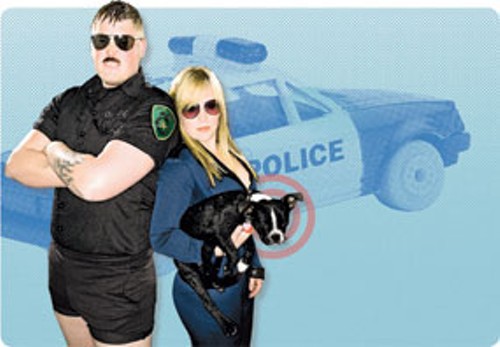Feature | Taylorsville 911!: A messy tale of cops, robbers ... and a little dog, too
By Stephen Dark @stephenpdark
Debbie Evans was perched on the edge of a narrow concrete bench in the Salt Lake County lockup, handcuffed to a stainless-steel bar that ran along the rim of the wall behind her.
A fight over ownership of her family’s dog, an 11-year-old Boston terrier named Oscar, had led to her incarceration. Evans, a 34-year-old mother of two adolescents with no criminal record, couldn’t believe it had come to this. She still can’t.
An hour before, she had refused to reveal Oscar’s location to Taylorsville Police Det. Casey Davies and four other officers who had surrounded her car in the driveway of her home at 2 p.m. on May 25, 2006. Andrea Dirker, a Midvale police officer in the narcotics division, had filed a complaint two weeks earlier, alleging two people fitting descriptions of Debbie Evans’ husband, Jim, and his 14-year-old son Justin snatched her dog from her mother’s driveway. The Evanses claim, however, that Dirker originally stole the dog from them.
When the Taylorsville officers threatened Debbie Evans with incarceration if she didn’t turn over Oscar, she didn’t believe them. Davies wasn’t joking. He
charged her with obstruction of justice, slapped the cuffs on her in her kitchen in the Evanses’ 90-year-old home in Garden Park, near Salt Lake City’s Sugar House neighborhood, and marched her down the quiet, tree-lined street to a squad car.The next thing she knew, she was in a pit with a bathroom and a telephone taking turns with that day’s DUI suspects to phone for help. Her husband, a commercial airline pilot, was on the other side of the country, in Raleigh, N.C. He says the police told him on the phone, “Your wife isn’t getting out of jail until we get the dog back.”
Jim Evans called his friend, Southwest Airlines pilot Chris Eyring. It was Eyring who had agreed to look after Oscar while the Evanses over several years tried to sell their Kentucky home, resolve some employment issues, and move back to Salt Lake City. “There was no one to watch the dog,” Jim Evans recalls. At the time Eyring agreed to “dogsit” Oscar, his live-in girlfriend was Andrea Dirker. When they broke up, Dirker took the dog with her.
“I can’t have Deb in jail,” Evans told Eyring. “I’m going to work out a deal with the prosecutor.” Evans arranged for Eyring to hand the dog over to Davies, along with his supervisor, Sgt. Rosie Rivera, and ex-West Valley SWAT team leader and then Taylorsville officer, Ed Spann, at the Humane Society of Utah. But first, Evans wanted the dog’s chip scanned in front of the officers to identify the registered owner.
Spann’s nickname at Taylorsville, Eyring says, was “Rambo.” Thanks to Oscar, Davies’ unfortunate sobriquet became “Ace Ventura, Pet Detective.” Throw in that the breed of dog they were hunting is prone to snoring and farting, according to Salt Lake City-based Boston terrier breeder Carol Enright, and the mayhem surrounding Oscar sounds more like an episode of Comedy Central’s cop parody hit, Reno 911, than routine policing.
“They were pretty pumped up,” Eyring says about how jumpy Davies, Spann and Rivera were at the animal shelter. “They wanted to take somebody to jail, they wanted to throw somebody onto the sidewalk.” He suspects Rambo, Rivera and Ace were hoping he would flee, clutching Oscar in his arms, and lead them on a high-speed chase across Salt Lake County. If so, they were disappointed. He handed Oscar over and Davies took the dog back to Dirker.
Debbie Evans was released six hours after she was booked into jail. No charges were filed against her. “That’s false arrest,” the Evanses’ lawyer, Jerry Conder, says. “It was done as an intimidation tactic to secure the dog for a fellow officer.” Eyring picked her up from the jail. As Debbie got into his truck, her Levi capris ripped. “I thought, ‘Perfect,’” she recalls. “I’ve just been in jail, my pants tore, I’ve had it, I’m done.” She dissolved into tears.
As with any custody dispute, there’s a murkiness to the emotional entanglements that underpin Oscar’s fate. Everyone has a point of view. But police reports and court documents point to highly questionable behavior by a detective with alleged business connections to the complainant and lack of supervision by his commanding officers. When you add the tax dollars spent on the police investigation and ongoing legal bills relating to the criminal and civil cases, the saga of Oscar the dog becomes less of a farce and more of a disturbing portrait of cronyism, profligacy and abuse of power.
The Evanses’ lawyer Jerry Conder also represents the state chapter of the Fraternal Order of Policemen [FOP]. Although Conder says he “doesn’t like suing peace officers,” the way Taylorsville Police Department behaved left him no choice. “They screwed up,” he says. “It was like swatting a fly with an atomic bomb.”
Theft charges against Jim Evans and his son Justin were eventually dropped. Nevertheless, the Evanses wanted their day in court. On August 31, 2006, Conder filed a $1.5 million federal lawsuit alleging unlawful arrest against Taylorsville City, Davies, then-police chief Larry Marx, Dirker, her mother and stepfather.
In building a case, Conder hired ex-Salt Lake County Sheriff’s Office veteran Nicholas Morgan to review the events. In his report, he claims, “This is a case of abuse of police powers with questionable objectives in mind.” That objective was to get the dog back to Dirker. She and her relatives recently settled with the Evanses for an undisclosed amount, Eyring says.
If Jim and Debbie Evans thought they were safe from further prosecution, though, they were misguided. This past March, Taylorsville City prosecutor Lorenzo Miller, husband of Salt Lake County District Attorney Lohra Miller, refiled charges against Jim Evans that he had dismissed five months after the dog was returned to Dirker. At the time of the dismissal, Miller had noted he would refile the theft charge as a class A misdemeanor. “Any other case, that’s the end of it,” Conder says. Indeed, for a year and a half, nothing happened. Then Miller resurrected the charges.
Det. Davies offered no new evidence in his probable-cause statement for the new charges. The only difference was the value of the dog. In the 2006 filing, it was listed as less than $300. The new charges put Oscar’s worth between $300 and $1,000, without any explanation for his sudden rise in value. That increase allowed Miller to raise the charge from a class B misdemeanor to a class A, which doubles Jim Evans’ potential jail time to a year and a fine of $2,500.
The new charges, Conder says, are more than suspicious. They certainly brought the Evanses’ civil lawsuit slamming to a halt. U.S. District Court Judge Ted Stewart, who is presiding over the civil suit, put it on hold so the criminal case can be dealt with. For Conder, the new case amounts to vindictive prosecution. He accuses Miller of aiding Taylorsville City’s attorneys—law firm Parsons Kinghorn Harris—in their battle against the Evanses’ federal lawsuit by dragging Evans into criminal court.
If true, such allegations would be oddly appropriate, given how far Taylorsville’s investigative division went on behalf of a fellow officer. “What is it worth that the police department treats you fairly and does not favor somebody else, particularly another officer?” Conder asks. Miller’s filing of charges, as with Det. Davies’ pursuit of the dog on behalf of Dirker, emphasize how far Taylorsville City will go to help out its friends and punish its enemies, even at the expense, it seems, of the constitutional rights of those it is sworn to serve.
When contacted by City Weekly for an interview, Davies declined to comment, as did Taylorsville’s Sgt. Rivera, the department’s public information officer, citing pending litigation. After first agreeing to an interview, Dirker did not respond to further calls.
The Evanses, however, want to talk. For Jim Evans, this saga is an indictment of the judicial system. “If this kind of thing happens over a dog, if things can go this far from an investigative and prosecutorial standpoint, then it’s pretty corrupt in my opinion,” he says. “It’s a buddy-buddy system in our case, and it shouldn’t be like that.”
More by Stephen Dark
-
Call it a Comeback
Long mired in economic depression, Midvale’s Main Street dusts off its small-town charm.
- Sep 20, 2017
-
Love Letters
Correspondence between a young woman at the Topaz internment camp and her beloved sheds light on Trump's America.
- Sep 6, 2017
-
Triggered
Veterans Affairs exists to help vets. So why did the Salt Lake VA appoint an anti-veteran chief?
- Aug 30, 2017
- More »
Latest in Cover Story
Readers also liked…
-
Forget the family pedigree—Robert F. Kennedy Jr should not be the next president of the United States
Trojan Horse
- Jun 21, 2023
-
Women decry harassment and toxic culture at St. George auto dealership
Men at Work
- Oct 11, 2023







